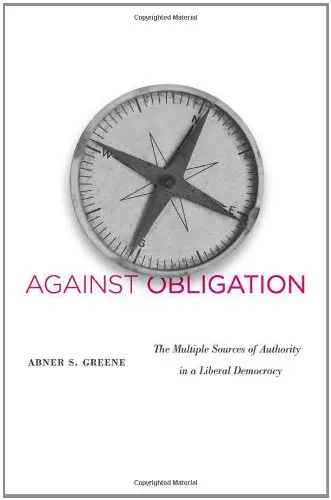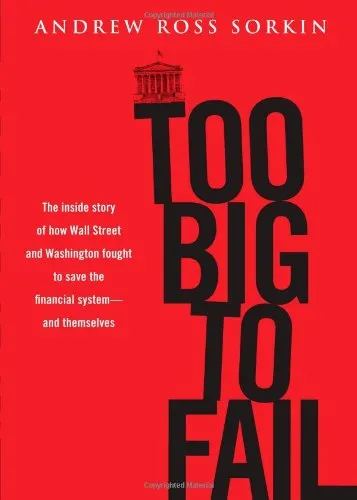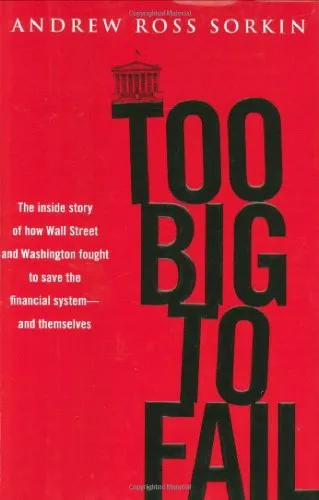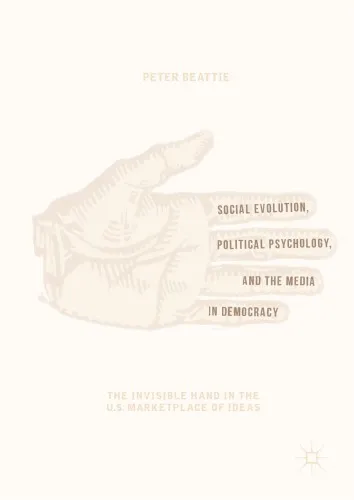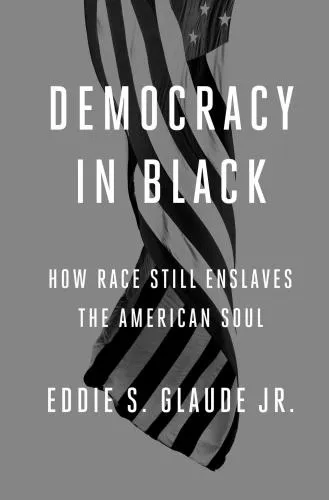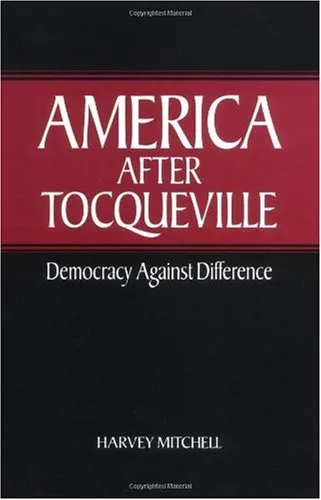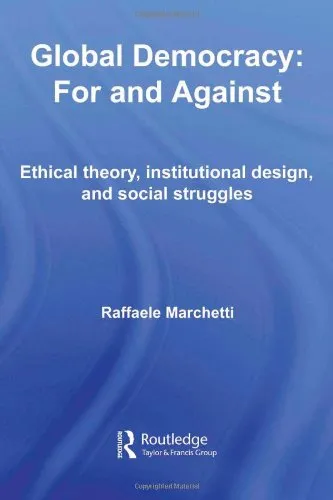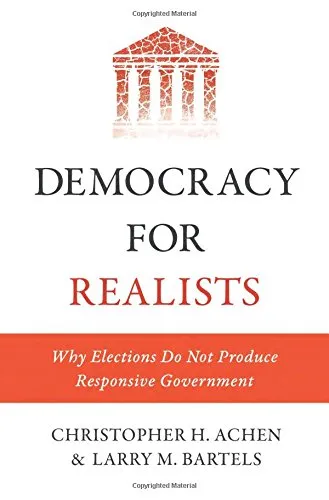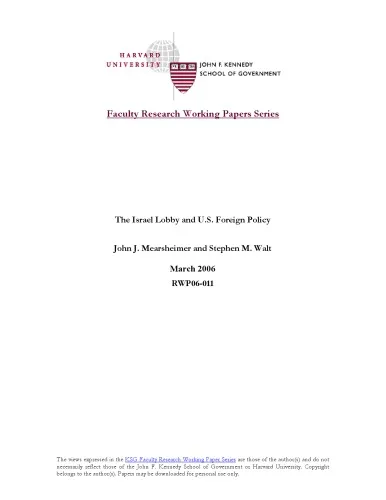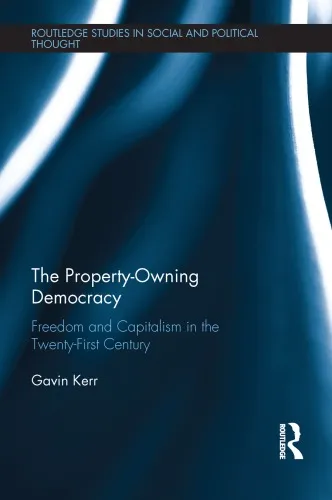Against Obligation: The Multiple Sources of Authority in a Liberal Democracy
4.0
بر اساس نظر کاربران

شما میتونید سوالاتتون در باره کتاب رو از هوش مصنوعیش بعد از ورود بپرسید
هر دانلود یا پرسش از هوش مصنوعی 2 امتیاز لازم دارد، برای بدست آوردن امتیاز رایگان، به صفحه ی راهنمای امتیازات سر بزنید و یک سری کار ارزشمند انجام بدینکتاب های مرتبط:
معرفی کتاب: Against Obligation
کتاب Against Obligation: The Multiple Sources of Authority in a Liberal Democracy نوشتهٔ آبنر اس. گرین، یکی از مهمترین آثار در حوزه فلسفه سیاسی مدرن است. این کتاب به واکاوی عمیق مفهوم "تعهد" در دموکراسی لیبرال پرداخته و ایدههای نوآورانهای را درباره منابع مختلف قدرت و مشروعیت در جوامع ارائه میدهد.
خلاصهای از محتوای کتاب
کتاب Against Obligation با طرح پرسشی اساسی آغاز میشود: آیا شهروندان در یک دموکراسی موظفاند همیشه از قوانین تبعیت کنند و نسبت به دولت وفادار باشند؟ نویسنده در پاسخ به این پرسش، مفهوم تعهد واحد و مطلق را که در بیشتر نظریههای سیاسی سنتی معمول است، به چالش میکشد. به جای آن، گرین معتقد است که در یک دموکراسی لیبرال، منابع قدرت و مشروعیت چندگانه هستند و این گوناگونی به شکلی پویا عمل میکند تا اساس جامعه آزاد را تثبیت کند.
گرین در گام نخست، نظریه تعهد مطلق به قانون و دولت را نقد میکند و نشان میدهد که چرا این نگرش با ماهیت پیچیده آزادی و برابری در دموکراسی سازگار نیست. سپس، نویسنده به ارائه چارچوبی تازه میپردازد که در آن شهروندان حق ارزیابی و حتی مقاومت در برابر قوانین ناعادلانه یا نهادهای نامشروع را دارند.
این کتاب همچنین به بحث پیرامون تنوع منابع authority میپردازد و تاکید میکند که مذهب، اخلاق، جامعه مدنی و حتی ارزشهای شخصی میتوانند به شکلگیری قدرت و مشروعیت در جامعه مدرن کمک کنند. گرین تأکید میکند که به رسمیت شناختن این تنوع برای تضمین مدارا و پیشبرد جوامع آزاد ضروری است.
نکات کلیدی کتاب
- تعهد مطلق به قوانین و دولت نباید در دموکراسی لیبرال وجود داشته باشد.
- آزادی و برابری در یک جامعه آزاد مستلزم پذیرش منابع متعدد authority است.
- مفهوم مقاومت مدنی میتواند ابزاری اخلاقی و مشروع برای اصلاح نهادها و قوانین ناعادلانه باشد.
- دموکراسی لیبرال باید فضا را برای تنوع اعتقادات و ارزشها باز بگذارد تا انسجام جامعه حفظ شود.
جملات برجسته از کتاب
"Obligation to the law cannot be absolute; it must be conditional upon the legitimacy of the state and its actions."
"Liberal democracy thrives not on monolithic adherence to authority but on the recognition and accommodation of diverse sources of values."
چرا این کتاب اهمیت دارد؟
کتاب Against Obligation به سوالاتی کلیدی درباره نقش شهروندان در دموکراسی لیبرال میپردازد و ایدهای ارائه میکند که میتواند پاسخگوی چالشهای سیاسی و اخلاقی مدرن باشد. در دنیایی که نگرانی درباره بحران مشروعیت دولتها و تنش میان آزادیهای فردی و مصالح عمومی افزایش یافته، این اثر میتواند بهعنوان راهنمایی برای اندیشیدن درباره دموکراسی عمل کند. ایدههای گرین برای پژوهشگران فلسفه سیاسی، فعالان حقوق مدنی، و سیاستمداران حائز اهمیت بوده و میتواند برای ترویج دموکراسی پایدار راهگشا باشد.
علاوه بر این، این کتاب به بحثی عمیق و چندوجهی درباره مبانی authority در جوامع لیبرال پرداخته و به چالش کشیدن مفروضات رایج، دعوتی جدی برای بازبینی نظریهپردازی سیاسی ارائه میدهد.
Introduction to 'Against Obligation: The Multiple Sources of Authority in a Liberal Democracy'
Written by legal scholar Abner S. Greene, 'Against Obligation' offers a thought-provoking critique of the notion that citizens or officials in a liberal democracy are universally obligated to obey constitutional or legal authority. Through meticulous analysis, Greene questions widely accepted principles and presents an alternate view of democratic authority, one that embraces multiple sources of moral, social, and political guidance.
The book challenges conventional thinking on the nature of obligations, both legal and moral, in a pluralistic democracy. Instead of advocating for a single, overarching source of authority—whether it be the Constitution, the law, or other institutional norms—Greene examines the interplay between different forms of authority in an individual's life. By engaging with political theory, constitutional law, and moral philosophy, the book creates a well-rounded argument that authority should be decentralized, nuanced, and context-specific.
Detailed Summary of the Book
At the heart of Greene's argument is the notion that the traditional concept of obligation is too rigid to account for the complexity of modern liberal democracies.
The book is divided into several chapters that explore various dimensions of this critique:
- Part One: Greene begins by analyzing the intuitive appeal of absolute obligation, particularly as it applies to obedience to the Constitution or laws of the state. He questions whether such obligations are morally defensible or practical in a society that values individual autonomy and pluralism.
- Part Two: A nuanced exploration follows of how legal and constitutional norms interact with personal morality and religious commitments. Greene suggests that while the state has authority, it should not claim exclusivity, allowing room for individuals to follow coexisting forms of moral authority.
- Part Three: In the latter sections, Greene builds the case for what he calls "permeable sovereignty." He suggests that no institution, including the government, should have absolute authority over individuals in a liberal democracy. Instead, authority should be viewed as a flexible, overlapping set of influences shaped by personal, social, and institutional factors.
Ultimately, Greene reframes the conversation about what liberal democracy should demand from its citizens and officials. He urges readers to embrace a pluralistic approach to authority, one that recognizes and respects the competition between various sources of guidance in public and private life.
Key Takeaways
- Liberal democracies should not demand unwavering obedience to the Constitution, laws, or government authorities.
- Authority is not monolithic; individuals derive their moral and ethical commitments from a variety of sources, including personal conscience, religion, and societal norms.
- The concept of "permeable sovereignty" allows for a more nuanced understanding of authority in a pluralistic society. This framework acknowledges the coexistence of, and sometimes tension between, multiple sources of authority.
- A truly liberal democracy should respect and value the diversity of its citizens’ commitments, rather than enforcing a singular notion of obligation or loyalty.
Famous Quotes from the Book
"A liberal democracy, if truly committed to human dignity and freedom, cannot insist on ultimate obligation to one source of authority."
"The heart of pluralism is recognizing that our lives are guided by overlapping, and sometimes conflicting, sources of authority."
Why This Book Matters
In today's world, where tensions between legal authority and personal values frequently arise, 'Against Obligation' offers an important framework for rethinking the relationship between the individual and the state. By challenging the doctrine of universal legal obligation, Greene makes a critical contribution to debates surrounding constitutional theory, jurisprudence, and political philosophy.
Moreover, the book's emphasis on pluralism resonates with contemporary debates about religious freedom, civil disobedience, and the limits of government power. For readers interested in the philosophy of law or the challenges of democracy, 'Against Obligation' provides invaluable insights into how we might navigate the complexities of modern governance while remaining true to liberal principles.
Whether you are a scholar, a student of political theory, or a concerned citizen, this book will provoke you to think deeply about the ways in which democratic societies negotiate authority, obligation, and freedom. It pushes us to redefine what it means to live in a truly pluralistic world, making it an essential read for our times.
دانلود رایگان مستقیم
شما میتونید سوالاتتون در باره کتاب رو از هوش مصنوعیش بعد از ورود بپرسید
دسترسی به کتابها از طریق پلتفرمهای قانونی و کتابخانههای عمومی نه تنها از حقوق نویسندگان و ناشران حمایت میکند، بلکه به پایداری فرهنگ کتابخوانی نیز کمک میرساند. پیش از دانلود، لحظهای به بررسی این گزینهها فکر کنید.
این کتاب رو در پلتفرم های دیگه ببینید
WorldCat به شما کمک میکنه تا کتاب ها رو در کتابخانه های سراسر دنیا پیدا کنید
امتیازها، نظرات تخصصی و صحبت ها درباره کتاب را در Goodreads ببینید
کتابهای کمیاب یا دست دوم را در AbeBooks پیدا کنید و بخرید
1646
بازدید4.0
امتیاز0
نظر98%
رضایتنظرات:
4.0
بر اساس 0 نظر کاربران
Questions & Answers
Ask questions about this book or help others by answering
No questions yet. Be the first to ask!
